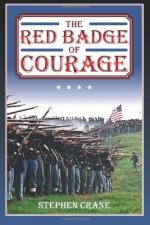|
|
The Red Badge of Courage Notes & Analysis
The free The Red Badge of Courage notes include comprehensive information and analysis to help you understand the book. These free notes consist of about 62 pages (18,446 words) and contain the following sections:
These free notes also contain Quotes and Themes & Topics on The Red Badge of Courage by Stephen Crane.
The Red Badge of Courage Plot Summary
The Red Badge of Courage is a fictional psychological portrait of a young soldier named Henry Fleming, tracing the thread of his emotions and reactions to events that transpire during an unnamed battle of the Civil War. Henry is an average farm boy from upstate New York, who dreams of the glory of battle that he has read about in school. He has enlisted in the 304th New York regiment, which fights for the Northern (Unionist) forces.
The novel opens with Henry's regiment in camp by a river, where they have been for several months. Rumors of upcoming battle fly among the men but are largely unfounded, and the perpetual anticipation throws Henry into a bitter interior fight. He questions if he has the inner strength and courage to become a good soldier and is unsure whether or not it is in his realm of capability. He knows battle only through schoolbooks and soldiers' stories, and fears the possible ridicule of his peers, should he be deemed a coward by running from battle.
The northern army is finally put on the move and marched across the river, where they meet with Southern (Confederate) forces. Henry's regiment is initially put in a reserve position, and he is able to witness battle before actually coming in contact with it. Finally his regiment successfully repels a charge by the enemy, and Henry feels relief and elation at his feeling of success. The enemy charges again, however, and Henry flees, in the belief that his regiment will be overrun. This sends Henry on a long day's journey along the battle lines, in which he bitterly reproaches himself for running, but at the same time tries to justify what he has done. He witnesses battle, then journeys into the surrounding woods, where he finds a decaying dead man in a clearing. Running away from the body and back to the battle, Henry takes up with the procession of wounded men trudging to the army's rear for care. There he meets his friend Jim Conklin from his regiment, who has been shot in the side. He cares for Jim with another man, called the "Tattered Soldier," until Jim dies in a field. The Tattered Soldier's repeated questions regarding Henry's supposed injuries anger and embarrass Henry until he leaves the Tattered Soldier alone to die in a field, a fact that later haunts Henry.
Leaving the Tattered Soldier, Henry witnesses the charge and subsequent retreat of a Union regiment. The men retreat right through the spot from which Henry is watching the battle, and a man that he stops to ask questions about the charge hits Henry in the head with the butt of his rifle, injuring him. Having been wounded by his own comrade, Henry is only able to stumble toward the rear. He is later helped back to his depleted regiment by a cheerful soldier whose face he never sees. Back in camp, Henry meets up with another man from his regiment named Wilson. Henry senses an incredible psychological growth and maturation in Wilson since their first days in camp, and envies him. The two become great friends.
The next day the battle continues, and Henry's regiment is placed on the edge of some woods and ordered to defend it. Here Henry achieves the classic valor for which he has sought; he fights so hard and courageously that both his comrades and his command look up to him. Later, while looking for water, both Henry and Wilson overhear a general speaking poorly of their regiment, saying he can spare them for a charge because they fight so poorly. This angers them, and creates in Henry the desire to show up the command. The regiment is sent in to charge for the first time, and amid heavy casualties, Henry saves the regiment's flag when the color bearer is shot. He becomes, along with Wilson, the noncommissioned leader of his regiment. The charge essentially fails at first and Henry's regiment is forced to retreat. Then however, they are charged by a Confederate regiment, and Henry's regiment repulses them, eventually taking their regimental flag. Even though the generals reproach the regiment's command for failing in the charge, Wilson and Henry are considered heroes in the classic sense, at least externally.
Henry undergoes countless interior changes throughout his ordeal, which offset the externally visible accolades of courage that the others shower on him. His newfound manhood at the end of the battle is described as a strong, clearheaded confidence, a sense of self-assurance that he had never before felt in his endless internal bickering. The internal peace and calm is a far cry from what had first brought him to war - the idealistic Greek-like portrayals of valor and manhood that he had been exposed to only in books.




